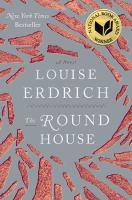
 A rape has been committed. But in this 2012 National Book Award winner, The Round House, author Louise Erdrich does not focus on the rapist, but on the victim, her family and on the narrator, her 13 year-old son Joe. In 1988 it’s a quiet Sunday on a North Dakota reservation, Joe and his father Bazil are bonding, pulling weeds and napping when they notice the time. “Where is your mother?” Bazil asks with an ominous tone that forecasts the family’s downward spin from the effects of the rape of Geraldine Coutts. Life for Joe is never the same. It seems his mother doesn’t even try to recover; her days are spent isolated in her bedroom in a haze of depression that no one can penetrate.
A rape has been committed. But in this 2012 National Book Award winner, The Round House, author Louise Erdrich does not focus on the rapist, but on the victim, her family and on the narrator, her 13 year-old son Joe. In 1988 it’s a quiet Sunday on a North Dakota reservation, Joe and his father Bazil are bonding, pulling weeds and napping when they notice the time. “Where is your mother?” Bazil asks with an ominous tone that forecasts the family’s downward spin from the effects of the rape of Geraldine Coutts. Life for Joe is never the same. It seems his mother doesn’t even try to recover; her days are spent isolated in her bedroom in a haze of depression that no one can penetrate.
But Joe’s life goes on. He hangs out with his friends, seeks comfort with his Aunt Clemence and the family patriarch, Mooshum, always wishing to recreate the happy life he once knew. Louise Erdrich, a Chippewa, has woven both the rich stories of tribal legends and the harsh reality of reservation life today for Native Americans. The novel abounds with characters that are honest, struggling, yet so irreverently funny. There are no-holds barred as the elders tell stories that should not be told to the young ears of Joe. But that is the point Erdrich is making: life on a reservation is raw yet mixed with earthy wisdom. As the rapist is found, tribal law comes in conflict with state law and Joe must deal with the knowledge that they are still in the world of inequality that existed for their ancestors.
The Round House is a compelling read with plot twists in the style of Defending Jacob and Gone Girl. But Erdrich delves more deeply, slowly into her characters, into the mind of a people who continue to struggle with injustice and their own identity. In accepting the National Book Award, Erdrich said she wanted to acknowledge “the grace and endurance of native women.” Her novel is a window to reservation life and the statistics of assault that she cites in her afterword notes is a sobering reality.
